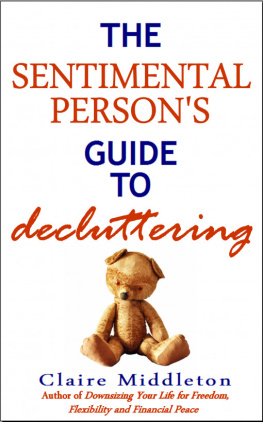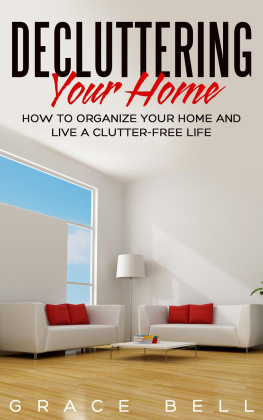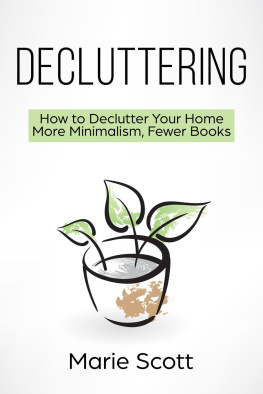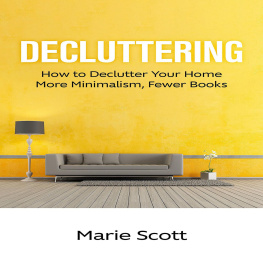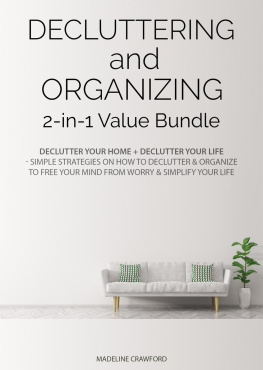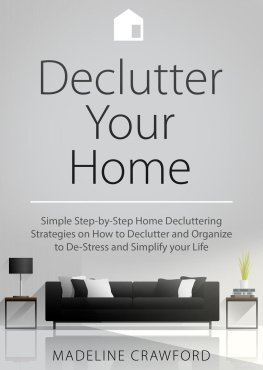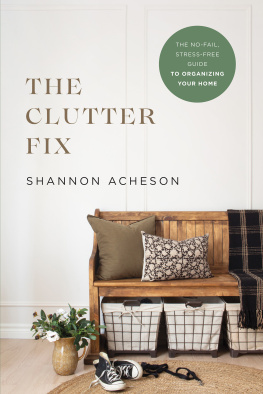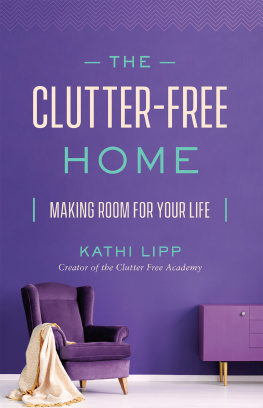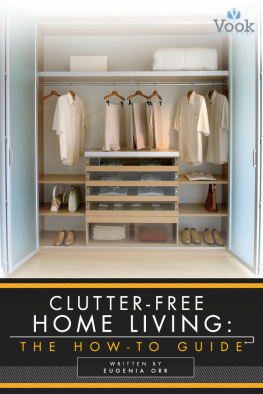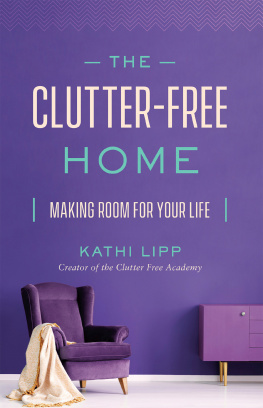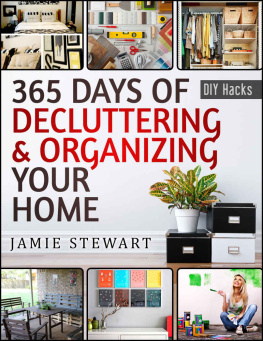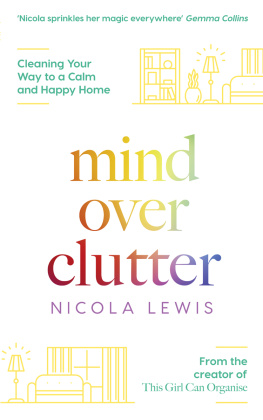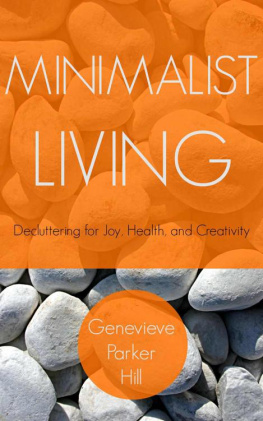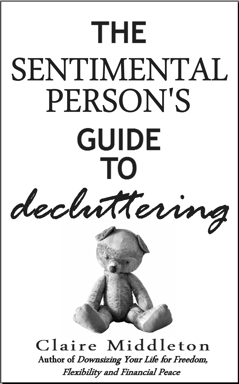
PARKER-ELGIN PRESS
The Sentimental Persons Guide to Decluttering
Copyright 2017, 2019 Claire Middleton
Published by Parker-Elgin Press, an imprint ofCardamom Publishers at Smashwords
Cover illustration used with permission ofShutterstock.com.
Cover design by Cardamom Publishers
Smashwords Edition License Notes
This ebook is licensed for your personal enjoymentonly. This ebook may not be re-sold or given away to other people.If you would like to share this book with another person, pleasepurchase an additional copy for each recipient. If youre readingthis book and did not purchase it, or it was not purchased for yourenjoyment only, then please return to Smashwords.com or yourfavorite retailer and purchase your own copy. Thank you forrespecting the hard work of this author.
All rights reserved. No part of this book may bereproduced in any form without written permission from thecopyright owner and publisher of this book, except in the case ofbrief quotations embodied in critical reviews and certain othernoncommercial uses permitted by copyright law. The author andpublisher have made every effort to ensure that the information inthis book was correct at the time of initial publication; however,the author and publisher do not assume and hereby disclaim anyliability to any party for any loss, damage, or disruption causedby errors or omissions, whether such errors or omissions resultfrom negligence, accident, or any other cause.
Scripture quotation is from:
The Holy Bible, English Standard Version (ESV)
Copyright 2001 by Crossway, a publishing ministryof
Good News Publishers. All rights reserved.
Names and identifying details of some personsdescribed in this book have been changed to protect theirprivacy.
Published by: Parker-Elgin Press, an imprint ofCardamom Publishers
P.O. Box 743, Janesville, WI 53547
ISBN 978-0-9980453-1-3
Table of Contents
For everything there is a season, and a time forevery matter under heavena time to keep, and a time to castaway.
Ecclesiastes 3:1,6b
Introduction
Whenyou feel claustrophobic in your own home, or you give up cleaningbecause theres just too much stuff to clean around, its time todeclutter.
When you get to the point where there arethings youd like to do with your living space, but you cantbecause theres no room, its time to declutter.
When you know theres a move in your future,and those old boxes full of stuff you havent opened in ages willdrive up the cost of that move, its time to declutter.
So why dont you declutter?
Many of us fail to declutter, no matter howmotivated we are to do so, because of the many obstacles todecluttering, a simple process that (in theory) shouldnt be veryhard.
And one of the biggest obstacles todecluttering is being sentimental.
The challenge of decluttering when youre asentimental person is that you may be so nostalgic thateverything has sentimental value to you:
Oh, wow! I just found all the sheet music from mychildhood piano lessons! (Your fingers havent touched piano keysin ten years.)
Oh, look! Its the cap off the beer my dad wasdrinking when our team won the World Series! (That bottle capshould have been pitched long ago.)
Oh, my! Its my hotel soap bar collection! (Thetraveling sales rep job ended years ago.)
Sentimental people see the memory value ineverything. Were so sensitive that even the most mediocre,unassuming item can have special meaning to us. Family and friendslook at us like were nuts: theyre thinking, Who else butyou would have kept that?
Theres nothing wrong with beingsentimental. Personally, I suspect people who have zero memoriesattached to anything, who become so minimalist that their life goalis to keep only a cup, a plate and a blanket, are actually prettycold-blooded.
But we sentimentalists get into trouble whenwe keep so many things for sentimental reasons that our collectionof possessions begins to overwhelm us. And when we try to cut back,to declutter, to reduce our burden, we quickly get stuck and wantto give up because its just too hard to let go of so many thingsthat have sentimental meaning to us.
I wrote this book to help those who want tolive with less stuff, to feel that freedom of being unburdened byfull attics and packed basements, but who have trouble becausetheyre sentimental people. I relate to you, because Ive beenthere.
I kept far too many items from my youth andfrom the many years we spent raising our large family. As a result,we ended up with a basement packed full of stuff. How I would dreamof the whole basement flooding so wed have to pitch everything, orlater on, that the storage units we rented would burn down so Iwouldnt have to deal with all the decisions we had to make aboutwhat to keep and what to give away or throw out. I knew that mostof our accumulation could go, but there was a nucleus of importantpapers, photos that never made it into albums, paper memorabilia ofour immediate familys history, and small keepsake items that Iwanted to save. Knowing I had to find that nucleus is what kept mechipping away at it instead of praying for a monsoon or becoming anarsonist.
But I didnt start chipping away at it untilI was forced to: a financial setback in 2007 required us to sellthe big house where we raised our family for nearly 20 years andmove to much smaller quarters. That meant we had to get rid of morethan half of our possessions. Most of the stuff was items I keptbecause they had sentimental value to me. They were so hard to giveup, because it felt like I wasnt just letting go of items, but ofmemories and happy feelings as well.
But that experience taught me that giving upbelongings I thought I could never let go of was worth the time ittook and the emotional pain I felt, because we now live with farfewer possessions very happily and comfortably.
I no longer feel the stress of
walking through stacks of boxes of stuffin the basement just to get to the washing machine,
paying good money for storage units fullof stuff we never use in our daily lives, or
feeling the mental weight of knowing thereare closets packed tight that I need to go through.
Im free of all that, and it feels sogood!
Many sentimental people never get toexperience that freedom: keeping possessions long after they dontneed them because theyre emotionally attached to them leads tolarge amounts of clutter packed everywhere, causing feelings oflethargy and even despair. Perhaps thats where youre at rightnow.
Take heart; you can change yoursituation, with the help of the stories and tips youll find inthis book.
So
if you want to live with more space andless clutter,
if you want to make your home seem largerand your family feel more comfortable thanks to more openspace,
if you want the room to try new things,whether its floor space so you can practice yoga, or attic spaceso you can set up an art studio
this book will help you reach that feelingof lightness and freedom without regret.
Youll discover:
strategies for giving up many of your sentimentalitems,
what you can learn from people who arentsentimental,
three rules for decluttering success (forsentimental people only!),
and the four steps of the decluttering process.
Youll also learn how to sort and categorizeyour sentimental items, with specifics for the seven groups ofitems that are the hardest to give up: what I call the SentimentalSeven.
Finally, well take a brief look at how toencourage those you live with to go through their own sentimentalclutter.
Next page
